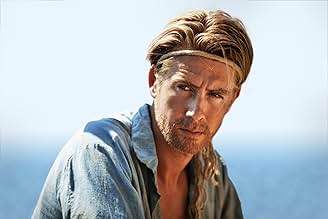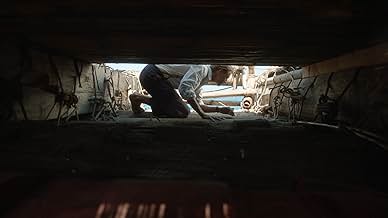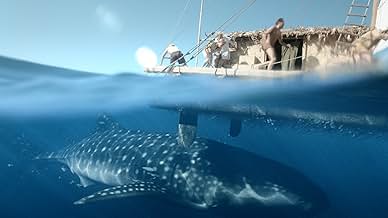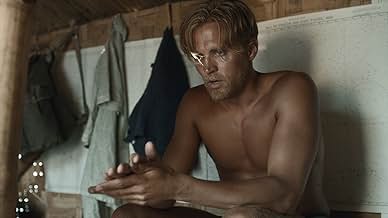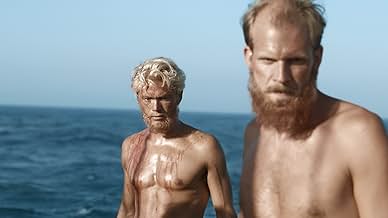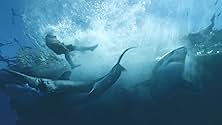Em 1947, o norueguês Thor Heyerdahl e mais cinco amigos navegam em uma balsa frágil para cruzar quase 7.000 km da América do Sul à Polinésia.Em 1947, o norueguês Thor Heyerdahl e mais cinco amigos navegam em uma balsa frágil para cruzar quase 7.000 km da América do Sul à Polinésia.Em 1947, o norueguês Thor Heyerdahl e mais cinco amigos navegam em uma balsa frágil para cruzar quase 7.000 km da América do Sul à Polinésia.
- Indicado a 1 Oscar
- 12 vitórias e 14 indicações no total
- Thor Heyerdahl
- (as Pål Hagen)
- Herman Watzinger
- (as Anders Baasmo Christiansen)
- Thor 6 yrs.
- (as Kasper Ameberg Johnsen)
Enredo
Você sabia?
- CuriosidadesLarge parts of the film were filmed in two versions at the same time, one in Norwegian, the other in English, in order to secure international funding. See ALTERNATE VERSIONS section for greater detail.
- Erros de gravaçãoThe crew were not worried about whether the ropes would hold the float together, as it is portrayed in the film. As we can see in the A Aventura de Kon-Tiki (1950) documentary, the balsa wood was much softer than the rope, and it was actually the rope that ate through the wood. The result was that the rope eventually was protected by the space that had been created around it.
- Citações
Epilogue: Bengt fell in love with Polynesia. He settled there and became a Consul General of Sweden. He died in 1997.
Epilogue: Erik built himself a sailboat, that became his home for 11 years. He worked as an artist until his death in 1972.
Epilogue: Torstein kept going on expeditions. He died in 1964 during an attempt to reach the North Pole on skis.
Epilogue: Knut resumed his career in military intelligence. He was also instrumental in the establishment of the Kon-Tiki museum. He died the Christmas of 2009.
Epilogue: Herman became the director of UN's Food and Agriculture organization. He died at Titica lake in 1986.
Epilogue: Thor wrote a book about Kon-Tiki. It was translated to over 70 languages, and sold over 50 million copies. The documentary about the expedition won an Oscar. Liv and Thor divorced after the Kon-Tiki expedition. Their boys lived with Liv, who later moved to the US where she died in 1969. Thor continued his work as an experimental archaeologist, author and explorer. He died in 2002.
- Cenas durante ou pós-créditosBefore the closing credits, short clips are shown in which original footage shot by Heyerdahl was reenacted by the "Kon-Tiki" actors: urinating overboard in the open sea, dancing with natives under palms, portraits, and the like. Along with this, brief notes concerning each crew member's path of life after the trip are given.
- Versões alternativasIn an unusual technique, the film was shot simultaneously in both Norwegian and English, with each scene being filmed twice, first in Norwegian and then in English, with the same actors. This resulted in two versions of the film to be released, one primarily for the Norwegian domestic market, the other for an international audience. In a few cases, such as action scenes and computer-generated sequences, they used the same shot, later adding English with dubbing.
- ConexõesFeatured in 70th Golden Globe Awards (2013)
- Trilhas sonorasFlickan i Havanna
("The girl in Havana")
Lyrics by Evert Taube (as Taube) and music by Horatio R. Palmer (as Palmer)
If nothing else, Kon-Tiki (the name of the aforementioned vessel) adds to the impressive list of superb films from Scandinavia this past year. From Headhunters (one of my favourites of 2012) to the overlooked Snabba cash (Easy Money), fare from this region has never been more accessible or memorable.
So now comes Kon-Tiki, the first Norwegian film to score both a nomination at the Golden Globe and Academy Award ceremonies, and it's rather easy to see why. This sweeping journey appeals squarely to Hollywood sensibilities, twisting up an epic, historical adventure about overcoming the odds, with human drama. Though this intentional slanting may take some of the complexity and grit out of the film in the end, praise is abundantly deserved for all those involved.
Chief on that list is filmmaking duo Joachim Rønning and Espen Sandberg, best known previously for the Luc Besson-produced Bandidas with Penelope Cruz and Selma Hayek, who craft something lavish and visually sumptuous out of this trek, despite the hurdle of being endowed with a budget of just $16 million.
By recreating Heyerdahl's raft, shooting out over the deep and using special effects only as infrequent enhancements rather than a crutch, these two lay the authenticity on thick and in doing so generate tension and wonder (sometimes simultaneously) like you wouldn't imagine. Kon- Tiki, though never overtly stealing, mirrors the most effective aspects of films like Cast Away, Jaws and Mutiny on the Bounty.
When Rønning and Sandberg aren't capturing sweeping, stunning shots of the Pacific (and the tiny boat at its mercy) they are letting the camera rest on the diminutive aspects of the voyage, at least so when compared to the grandness of what's around them. The ropes lashing together the massive balsa wood beams strain and groan in the water, summoning us back to an earlier scene where two sailors warn Heyerdahl that a raft of that nature will inevitably break apart with the movement of the logs. Sharks silently circle and the boat slowly crumbles as the wood absorbs seawater. These quiet moments are as unnerving as anything you'll see on the big screen.
Likewise, there are grander, more elaborate moments that drip with tension all the same, as when storms hit, men are cast overboard, and once again sharks, though proving to be one of the lesser threats in the scheme of things, use their mythos alone to chill to the bone. If not as complex as it could have been, Kon-Tiki is certainly never dull.
The cast of unknown actors are also strong, even if by the time the credits role their sporting of Grizzly Adams-like beards makes identifying between some of these brave men difficult. Leading the way as the driven Heyerdahl is – wait for this one – Pål Sverre Valheim Hagen, anchoring (no pun intended) the film as a man intent on proving his settlement theory to sceptical scholars. Joining him is engineer (and refrigerator salesman) Herman Watzinger (Anders Baasmo Christiansen) navigator Erik Hesselberg (Odd Magnus Williamson) ethnographer Bengt Danielsson (Gustaf Skarsgård) and two soldiers acting as radio men Knut Haugland and Torstein Raaby (Tobias Santelmann and Jakob Oftebro respectively).
Together, crammed together like sardines, they make the 101-day journey, each bringing not only their respective skill-sets but demons as well. Those versed in Heyerdahl's novel or the documentary of the voyage (the winner of the 1950 Oscar for Best Documentary Feature) may cry afoul at some of the changes that have been made in service to crafting a more dramatic effort, particularly tweaks to the Watzinger character, but they will in no way impact how most will respond to Kon-Tiki.
Though not as weighty or viscerally lasting as some fare that pops up in the Best Foreign Language Film category, it is, however, infinitely accessible to anyone who usually turns their nose up at that particular segment of the ceremony. Kon-Tiki is a strong import, fascinating and thrilling in equal measure and a film that is just as much about the perils of nature as it is about the gratification that comes with conquering it.
- Simon_Says_Movies
- 9 de fev. de 2013
- Link permanente
Principais escolhas
Detalhes
- Data de lançamento
- Países de origem
- Centrais de atendimento oficiais
- Idiomas
- Também conhecido como
- Kon-Tiki
- Locações de filme
- Nu Boyana Film Studios, Sófia, Bulgária(New York exterior scenes)
- Empresas de produção
- Consulte mais créditos da empresa na IMDbPro
Bilheteria
- Orçamento
- US$ 16.600.000 (estimativa)
- Faturamento bruto nos EUA e Canadá
- US$ 1.517.410
- Fim de semana de estreia nos EUA e Canadá
- US$ 22.168
- 28 de abr. de 2013
- Faturamento bruto mundial
- US$ 22.842.887
- Tempo de duração1 hora 58 minutos
- Cor
- Mixagem de som
- Proporção
- 2.35 : 1
Contribua para esta página






